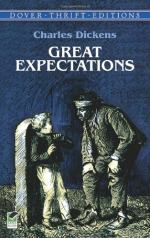It was easy to make sure that as yet he knew me no more than if he had never seen me in his life. He looked across at me, and his eye appraised my watch-chain, and then he incidentally spat and said something to the other convict, and they laughed and slued themselves round with a clink of their coupling manacle, and looked at something else. The great numbers on their backs, as if they were street doors; their coarse mangy ungainly outer surface, as if they were lower animals; their ironed legs, apologetically garlanded with pocket-handkerchiefs; and the way in which all present looked at them and kept from them; made them (as Herbert had said) a most disagreeable and degraded spectacle.
But this was not the worst of it. It came out that the whole of the back of the coach had been taken by a family removing from London, and that there were no places for the two prisoners but on the seat in front, behind the coachman. Hereupon, a choleric gentleman, who had taken the fourth place on that seat, flew into a most violent passion, and said that it was a breach of contract to mix him up with such villainous company, and that it was poisonous and pernicious and infamous and shameful, and I don’t know what else. At this time the coach was ready and the coachman impatient, and we were all preparing to get up, and the prisoners had come over with their keeper — bringing with them that curious flavour of bread-poultice, baize, rope-yarn, and hearthstone, which attends the convict presence.
“Don’t take it so much amiss, sir,” pleaded the keeper to the angry passenger; “I’ll sit next you myself. I’ll put ’em on the outside of the row. They won’t interfere with you, sir. You needn’t know they’re there.”
“And don’t blame me,” growled the convict I had recognized. “I don’t want to go. I am quite ready to stay behind. As fur as I am concerned any one’s welcome to my place.”
“Or mine,” said the other, gruffly. “I wouldn’t have incommoded none of you, if I’d had my way.” Then, they both laughed, and began cracking nuts, and spitting the shells about. — As I really think I should have liked to do myself, if I had been in their place and so despised.
At length, it was voted that there was no help for the angry gentleman, and that he must either go in his chance company or remain behind. So, he got into his place, still making complaints, and the keeper got into the place next him, and the convicts hauled themselves up as well as they could, and the convict I had recognized sat behind me with his breath on the hair of my head.
“Good-bye, Handel!” Herbert called out as we started. I thought what a blessed fortune it was, that he had found another name for me than Pip.
It is impossible to express with what acuteness I felt the convict’s breathing, not only on the back of my head, but all along my spine. The sensation was like being touched in the marrow with some pungent and searching acid, it set my very teeth on edge. He seemed to have more breathing business to do than another man, and to make more noise in doing it; and I was conscious of growing high-shoulderd on one side, in my shrinking endeavours to fend him off.




